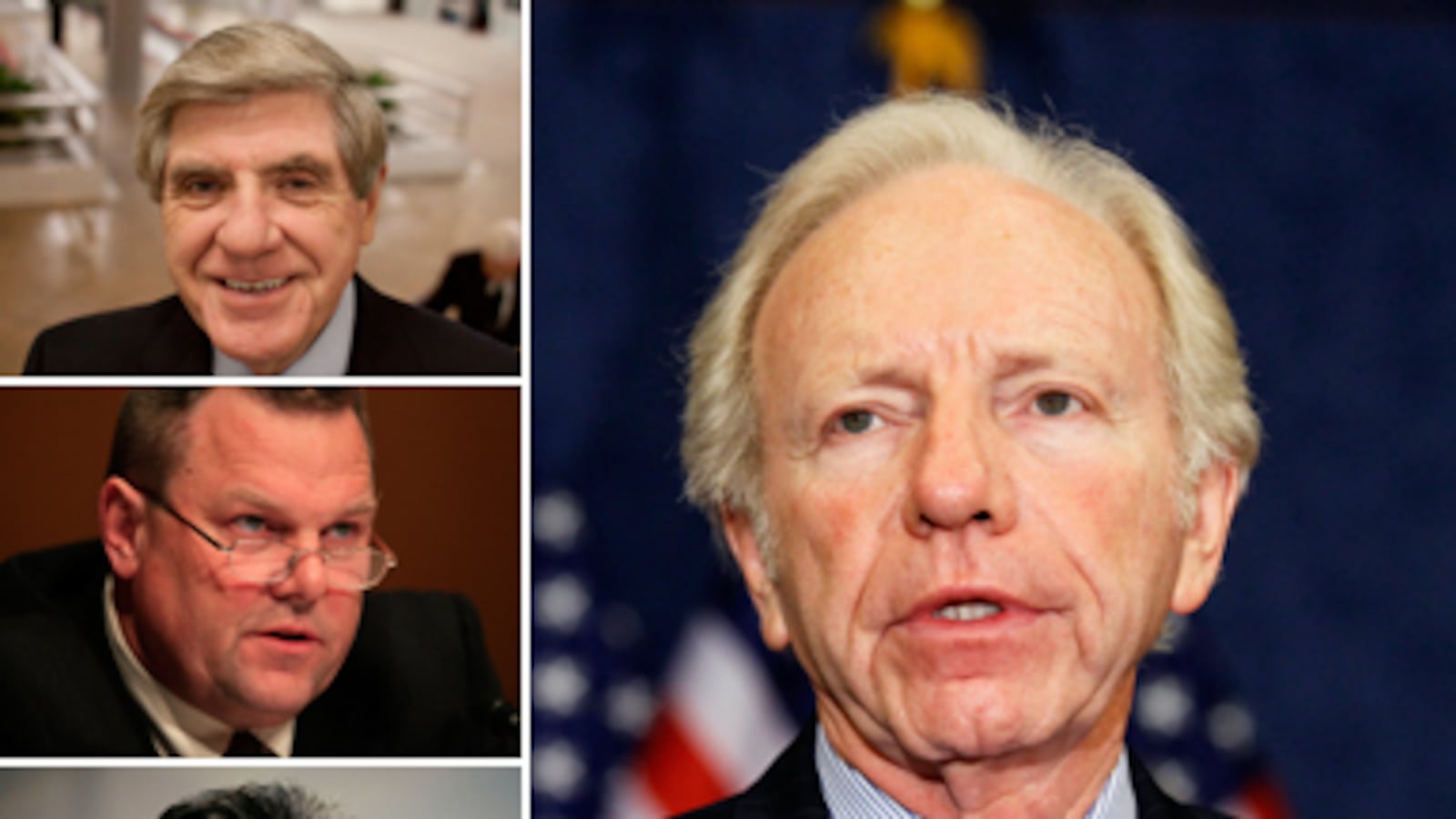You won’t have Joe Lieberman to kick around anymore, liberals.
With the independent riding off into the sunset rather than charging into almost certain electoral disaster, liberals will go into the 2012 elections without a long-anticipated crack at unseating their ultimate supervillain. Lieberman, whose passionate defense of the Iraq War cost him his party’s backing in 2006, is hardly the only sitting senator to enrage progressives lately—moderates like Ben Nelson, Jon Tester, and Joe Manchin all have threatened to inherit his mantle as the base’s most hated Democrat in recent weeks. And with each up for reelection in 2012, some critics have even talked up primary challenges.

At the top of the list is Nelson of Nebraska, who recently earned the title of “ Most Disloyal Democrat” when CQ Politics tallied his votes and found he backed his party only 54 percent of the time on key votes, by far the lowest percentage for senators of either party. His office responded by proudly posting the news on its website. Nelson is best known for his role in the health-care debate, first for dragging his feet on supporting the Democrats’ plan and then for his insistence on special treatment for his state, which became a national embarrassment after Republicans branded it the “ Cornhusker Kickback”. He also ticked off labor, a key backer of other Democratic primary challengers, by opposing so-called card check legislation and blocking the president’s appointment of union-friendly Craig Becker to the National Labor Relations Board.
Progressive Change Campaign Committee co-founder Adam Green, who helped run Bill Halter’s highly competitive primary race against Sen. Blanche Lincoln in Arkansas last year, said in a recent interview that Nelson was an ideal candidate for a similar challenge in 2012. Charles Chamberlain, political director for Democracy for America, which teamed up with the PCCC on ads that pressured Nelson on health care in 2009, said his organization could look to unseat Nelson as well. The problem is finding a credible challenger.
“There’s no question our members in Nebraska would like to see Ben Nelson replaced with a better Democrat,” Chamberlain told The Daily Beast. “That said, it doesn’t look like anyone is viable statewide who has given any indication they’re thinking about running.”
The most popular choice for progressives would likely be Scott Kleeb, a young Democrat who drew national attention with unsuccessful campaigns for the House in 2006 and Senate in 2008. But Kleeb told The Daily Beast they shouldn’t hold their breath.
“Not a chance,” he said, when asked about a potential primary run. “I’m very fond of the senator.”
“If a very high-profile Democrat went after Baucus in a primary and if there was enough of a contest on the Republican side in the primary to keep them on their own side, Baucus would be in serious danger.”
Kleeb’s wife, Jane, who runs a progressive advocacy group called Bold Nebraska, said the Democrats’ weak field in the conservative state made Nelson liberals’ only choice.
“Nelson can be a very frustrating political figure, but progressives here are very happy with him,” she said. “One, because he’s all that we have, to be quite honest. Two, he really does vote the right way on the big bills like health care, food safety, and Don’t Ask Don’t Tell.”
Another Western politician who has drawn primary talk in recent months is Jon Tester. Elected with strong support from national progressives, Tester recently ditched Democrats to vote against the DREAM Act, which would have created a path to citizenship for young illegal immigrants who served in the military or went to college.
Markos Moulitsas, founder of the influential Daily Kos and an enthusiastic Tester supporter in 2006, responded by calling for a primary challenge.
“I feel personally betrayed,” he wrote in a blog post. “Not only will I do absolutely nothing to help his reelection bid, but I will take every opportunity I get to remind people that he is so morally bankrupt that he’ll try to score political points off the backs of innocent kids who want to go to college or serve their country in the military.”
Matt Singer, a progressive activist in Montana who worked as a communications aide on Tester’s 2006 campaign, acknowledged the senator had ticked off many of his former supporters in recent months.
“I think a challenge from the left is not impossible,” he said, but added that it was still “unlikely” given Tester’s overall popularity and positive relationship with potential challengers. “My own friends who have become critics are putting less energy behind his reelection, but they’re not yet to the point they’d want to prioritize a fight against him either.”
Pat Williams, a former congressman representing Montana’s lone statewide district, said he thought that Tester was likely in the clear for now. However, he added that the state could still be host to a Lieberman-style challenge in 2014 when longtime incumbent Senator Max Baucus, who has also fought with the Democratic base at various points, is up for reelection.
“He’s in a lot more trouble with Democrats,” Williams said. “If a very high-profile Democrat went after Baucus in a primary and if there was enough of a contest on the Republican side in the primary to keep them on their own side, Baucus would be in serious danger of losing the nomination.”
The newest member to lay claim to Lieberman’s legacy of ticking off progressives is West Virginia Senator Joe Manchin, who will be up for reelection in 2012 after winning a campaign to complete the late Sen. Robert Byrd’s term. Already considered a relatively conservative Democrat, Manchin tacked aggressively to the right against his Republican opponent, at one point cutting an ad in which he fired a bullet through a copy of the Democrats’ health care bill. The violent spot has been under renewed criticism in the wake of the Arizona shooting. He hasn’t done much to improve his image with the left since taking office—he was one of the only Democrats to oppose repealing Don’t Ask Don’t Tell and skipped the final vote to attend a Christmas Party. But Manchin, who was an extremely popular governor when he ran for Senate, is considered a lock to secure his party’s nomination.
All three of these conservative-leaning Democrats are missing the most important ingredient that made Lieberman so vulnerable on his left flank—a solid blue-state electorate. The base is far more likely to put up with a less-than-ideal candidate so long as they have the best chance of keeping Republicans from taking over. But as Lincoln’s struggle last year in Arkansas demonstrates, even a conservative state could be ripe for a serious primary fight if the right candidate comes along.
“In no case have I heard of a credible primary challenger, at least yet…There’s plenty of time for challengers to come forward, of course,” Larry Sabato, director of the Center for Politics at the University of Virginia, told The Daily Beast. “But these are three tough states for Democrats in 2012. The incumbents have the best chances to hold the seats.”
Benjamin Sarlin is the Washington correspondent for The Daily Beast and edits the site's politics blog, Beltway Beast. He previously covered New York City politics for The New York Sun and has worked for talkingpointsmemo.com.






